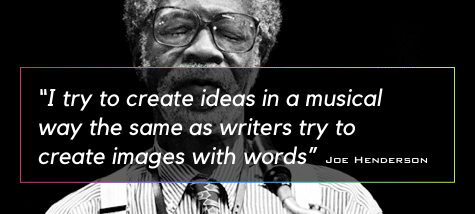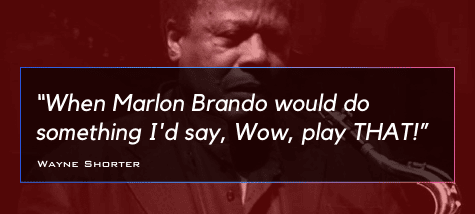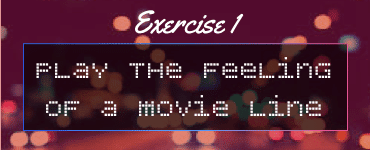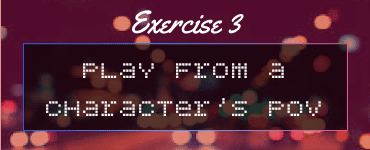Sometimes a change in perspective is all you need. Jazz improvisation is a demanding pursuit, one that combines intellect, feeling and expression. It’s easy to grasp the music theory side of things, but it’s much more difficult to grok the more dubious concepts…things like strong phrasing, connecting ideas, having a unique musical perspective, or the concept of “telling a story.”
The thing that nobody ever thinks about is that you’re not limited to the confines of jazz or music to draw inspiration from to help clarify these more esoteric concepts.
In fact, there’s inspiration all around you, from the books you read to the people you meet and the places you go.
But one of the most obvious and most effective places to draw inspiration from you’re already highly familiar with: the craft of writing.
Drawing inspiration from writing
Jazz is a language, but because it’s a musical language it’s difficult to define exactly what that means.
By turning to an actual spoken language and understanding the precise use of syntax and strategies skilled writers use to shape this language, you can gain a whole new perspective on how to think about improvising a solo.
This idea comes from one of the greatest tenor saxophonists to ever live: Joe Henderson.
“I try to create ideas in a musical way the same as writers try to create images with words. I use the mechanics of writing in playing solos. I use quotations. I use commas, semicolons. Pepper Adams turned me on to a writer, Henry Robinson. He wrote a sentence that spanned three or four pages before the period came. And it wasn’t a stream of consciousness that went on and on and on. He was stopping, pausing in places with hyphens, brackets around things. He kept moving from left to right with this thought. I can remember in Detroit trying to do that, trying to play the longest meaningful phrase that I could possibly play before I took the obvious breath.”
Joe Henderson sounds so different than other players, and it’s because he’s thinking differently than other players. He’s not limited by the chords or by his musical devices.
Listen to Joe play Recorda Me while keeping in mind this syntactical way of thinking. Do you hear it?
He’s transcended the mechanics of music by expanding his understanding of musical structure to that of writing, giving him a whole new perspective to play from.
If he said he’s using things like quotations and commas, just imagine what else he’s using that he didn’t share! Who knows?
But the important takeaway is that to achieve a different result or a fresh approach, you need a new perspective that gives you new ways to understand, structure, and manipulate the same old information.
Practice exercise 1:
- Think about the mechanics of writing and what each element sounds like
- What does a comma sound like? A period? Quotations? Parenthesis? Semicolons? A headline?
- Write out every element you can think of and detail how each would sound in terms of jazz improvisation
- Take each element and practice improvising with it in mind
Practice exercise 2:
- Find a passage from one of your favorite writers
- What makes it unique/special/different/interesting/amazing?
- Distill these unique qualities into defined concepts just as Joe Henderson did with Henry Robinson’s never-ending sentence.
- Improvise with this concept in mind
Practice exercise 3:
- Think about the high-level components of writing, things like sentence and paragraph structure, thematic development, character development, or the overall form of the work
- Select one of these components that intrigues you
- Clarify what this concept means to you in terms of music
- Improvise with this concept in mind
Take each of these exercises one-at-a-time and spend at least a week working through it.
And when you’re away from your instrument you can improve the other side of the coin: your writing skills.
Besides reading a lot, there are several books that I highly recommend if you’re interested in improving your skill as a writer:
Writing Tools by Roy Peter Clark
On Writing Well by William Zinsser
The Elements of Style by Strunk and White
Bird by Bird by Anne Lamott
Although easy to understand and apply in a musical context, writing isn’t the only avenue for inspiration…
Drawing inspiration from film
Thinking like a writer is just one idea. It’s a good idea and one that greats like Joe Henderson have taken full advantage of.
Another excellent source of inspiration is film.
Legendary tenor saxophonist Wayne Shorter specifically draws from this source.
Musical influence for me came from movies, the way people acted on the screen or the stage. I would think, ‘I want to do something the way Humphrey Bogart did in that movie.’ When Marlon Brando would do something I’d say, ‘Wow, play that!’ Or a total movie that was done well and got into your life. I’d get so into the film I’d forgot I was in the theater. The idea is to transcend music. And also to transcend the academia of music. Something else manifests, something else takes place. Theoretically you can say that any sound is neutral, but with the human element and the response or reaction, any song begs to differ.
Wayne Shorter never ceases to amaze me. Listen to 502 Blues with the idea in mind that he’s influenced by film. Do you hear it?
Listen to the drama. To the change in dynamics. To the vibe…
It’s all there. With lighting and scene changes. Like watching a movie.
Practice exercise #1
- Find a specific line in a film that speaks to you
- Translate the line into a musical concept
- Apply this concept while you improvise
Practice exercise #2
- Find a film you love
- Within that film, select a scene that creates a “vibe” that affects you, that makes you feel a certain way
- Translate this feeling as best you can into a musical concept
- Improvise with this vibe concept in mind
Practice exercise #3
- Find a specific character in a film that interests you
- Define who that character is. What traits, actions, and qualities make up that character?
- Translate these traits and qualities as best you can into musical terms
- Improvise as though you were playing through this character’s lens of life
Drawing inspiration from everywhere
Writing and film make great sources of inspiration, but you can use just about anything that you find interesting.
Here are a few to get you started:
Athletics – You can use the concept of “sets and reps” in your practice, or the idea that you have to train a series of sequential exercises that get progressively more difficult to be able to perform something complex or hard.
Cooking – When you cook you’re constantly experimenting and adjusting as you progress. It’s natural to improvise while cooking, hence jazz improvisation has a similar line of thought.
Drawing and painting – The process of drawing has all sorts of concepts that you could apply to music: light and shade, contrast, color…
Dance – The idea to move in an intended way could give you inspiration of how to play
Design – Crafting every detail with purpose and intent is exactly how we should play music. The concepts of order and structure and being creative within limitation all relate to jazz improvisation.
Comedy – The idea of a setup and punchline or a running gag joke is a similar process to improvising. Also, stand-up comedy and improv comedy obviously have a ton in common with improvising jazz.
The best jazz musicians to ever live have drawn inspiration beyond music.
Whether it be writing, film, spirituality, or any other interest, they’re all tools that can give you a different perspective, allowing you to express yourself in new ways.
Take a close look at the interests in your life and you’ll see, they can open up doors to how you think about music that you never would have discovered otherwise.
Everything you learn, pursue, and experience in your life can make you a better jazz improvisor!


















